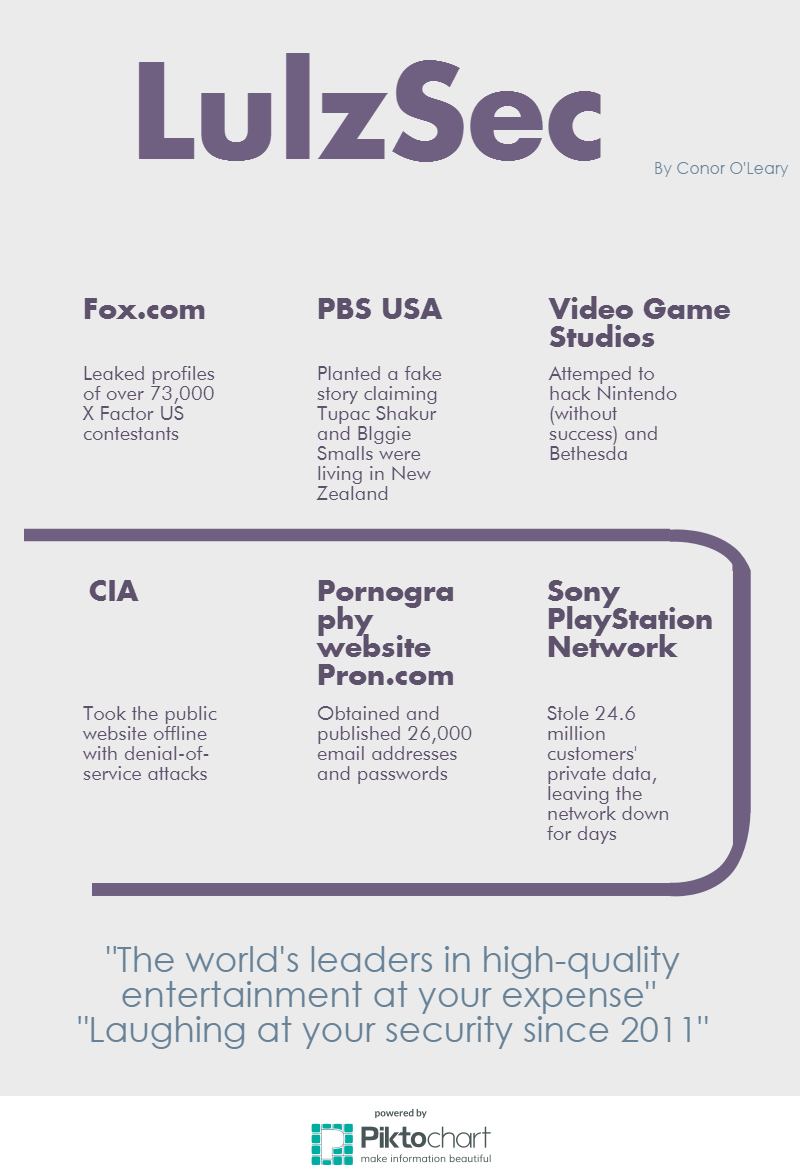
(via BBC)
So the last blog post focused on Anonymous and their efforts to bring freedom, justice and trust to the internet and the global community in general. But of course there is a much darker side to hacktivism and the anonymous nature of cyberspace. Various groups operate online with aims to commit cybercrimes, and one of the most well-known examples of one of these groups getting it wrong is LulzSec. A group who conducted a 50 day rampage across the internet disrupting various sites like FOX and the CIA.
As Charles Arthur reported, LulzSec was founded and formed in the online chatrooms for the Anonymous collective. David Gilbert also spoke about the members Topiary, TFlow, PwnSauce, Kayla, AVUnit and Sabu, spending nearly 20 hours a day in each other’s online company, while never actually meeting or know anything about their personal lives.
“But the lulz didn’t last.”
The group’s leader became an informant and snitched on 4 of his fellow members, with AVUnit never being caught.
Here’s a infographic I made detailing some of their exploits before they were arrested and jailed for their actions

Hi there!
This post was a very informative look at a hacking group that I had previously not known much about at all. Your inforgraph really works well in filling in the gaps between what you mentioned in your contextual post above.
I don’t actually have anything to suggest in order to improve this post, but here is a link to an article that you might find useful in learning more about “hacktivist” culture: http://goo.gl/Qxjjbz
Do you believe the actions taken by Anonymous are justifiable based on the claim that they are acting to release free press and bring justice, or do you believe that hacking isn’t the answer to this? In my post, I mentioned that having a free press means access to all information, sought or unsought and that having to turn to companies such as wikileaks as a way to do this, is having a bad stigma attached to it. causing hacking culture to be known as something bad – do you think there is a way that hacking can be redefined in order to repeal the bad connotations behind the word?
Great use of hyperlinks, its a really simple way to extend your content further. You might enjoy this article on LulzSec hacker Hector Xavier Monsegur its a long but detailed and interesting read
http://nymag.com/news/features/lulzsec-sabu-2012-6/
It’s great that you emphasised the disparity between the groups Anonymous and Lulzsec as hacktivists, considering the latter to be the more vindictive side to the hacktivist cause. I must have missed the mention of Lulzsec off-shooting from Anonymous itself though, thanks for including it!
While not conducted by Lulzsec, the breach of the affairs website Ashley Maddison would be another example of this more personal brand of hacktivist attacks, do you think that sort of information should adhere to the hacktivist notion of complete transparency? Do these sorts of groups even deserve the title of “hacktivist”, given that the information they dump is often massive amounts of random personal information, instead of socially/politically significant data?
It really is the Dark Side of hacking when you get to groups like Lulzsec – there’s a huge difference in my mind to targeting a specific organisation’s site as a statement against there actions, compared to just straight up leaking personal details from innocent workers at major companies. (To be fair, friends of friends were ordinary every day people at FOX who had their deets leaked and actually ended up having to leave their homes for a few days as a result of doxing, so maybe I’m thinking on too personal a level). Maybe motives are unable to be narrowly focused with such large groups of individuals.
This post is exactly what I needed! I was really struggling to find a comprehensive list of all the ‘achievements’ of LulzSec in one place and you’ve done it beautifully in your infographic! I also really like how you’ve complemented the infographic with your text by laying down some background information about the group and discussing what the group dynamic was like – i found this article which talks about the ‘leader’ betraying the rest of the group http://gizmodo.com/5890825/lulzsec-leader-betrays-all-of-anonymous – I’m not sure how much of it I believe, and I obviously don’t know the full story, but it is interesting to read and get an idea of the lack of loyalty and connection between group members.
Thanks !